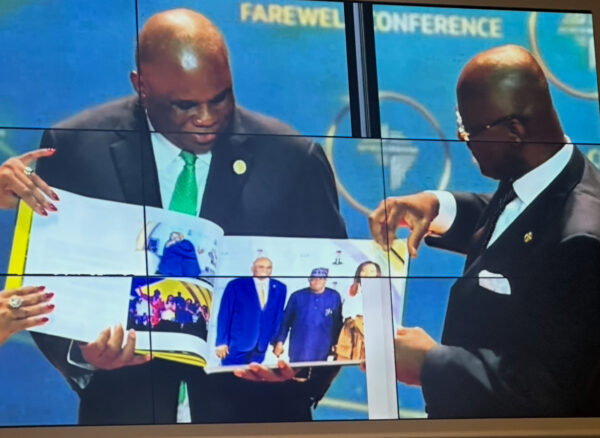Cairo, October 24, 2025. When Zimbabwe, ravaged by hyperinflation, burdened with debt, and under international sanctions, saw all international financial institutions turn their backs, one remained: Afreximbank. Under the leadership of Benedict Oramah, who bids farewell to the bank on October 24, 2025 in Cairo, the institution founded in 1993 has emerged as the financial pillar of economic pan-Africanism, embodying a simple and powerful idea: African risk deserves to be taken on by Africans themselves.
A decade of strategic transformation
Assuming the presidency in 2015, Benedict Oramah transformed Afreximbank from an import-export bank into a continental development bank. The year 2016 marked a turning point: the bank moved beyond its commercial specialization to finance development in all its dimensions – industries, infrastructure, health, agriculture, intra-African trade. As a result, the total balance sheet, which was less than $10 billion in 2015, now exceeds $42 billion. Equity stands at $7.3 billion, while cumulative commitments exceeded $22 billion in 2024.
Operating in over 50 countries, Afreximbank finances commercial banks, large industrial enterprises, and states facing liquidity constraints. Its rapid intervention capacity and decentralized decision-making model have made it the African lender of last resort.
Zimbabwe, a symbol of Afreximbank’s loyalty
It is in Zimbabwe that Oramah’s institutional courage found its most striking expression. While all major institutions were withdrawing, Afreximbank maintained its presence and support:
- 2019: a $500 million credit line to stabilize the exchange system and ensure vital imports (fuel, wheat, medicines).
- 2020: a $250 million emergency facility to finance the health response and pandemic-related purchases.
- 2022: a $400 million program for the rehabilitation of the energy and mining sector, notably through ZESA Holdings and the Zimbabwe Mining Development Corporation.
- Support for the Fidelity Gold Refiners gold refinery project, a cornerstone of the national strategy for local value addition.
In total, over $1.2 billion has been committed to Zimbabwe over the decade – a gesture of faith in a country abandoned by international markets.
From Covid-19 to AfCFTA: the continent’s banker
During the pandemic, when Africa was excluded from vaccine supply chains, Afreximbank played a decisive role. Under Oramah’s leadership, the bank established a $2 billion financing line for the AVAT (African Vaccine Acquisition Trust), enabling over 30 African countries to obtain doses through the Africa CDC platform. This episode established Afreximbank as a tool for the continent’s financial and health sovereignty.
Structurally, the bank has also become the financial arm of the AfCFTA (African Continental Free Trade Area). It mobilized over $6 billion to support the agreement’s implementation, including through an Adjustment Fund to assist states and businesses in transitioning to the single market. It also launched the PAPSS (Pan-African Payment and Settlement System), an intra-African payment system in local currencies that reduces dependence on the dollar and facilitates intra-continental trade.
The bet on South Sudan and the opening to high-risk areas
In the logic of “development through engagement,” Benedict Oramah expanded the bank’s activities to fragile economies. South Sudan, torn by years of war, thus benefited from the first international financing structured by Afreximbank – a pioneering operation later followed by HSBC and other institutions. This approach – intervening where no one else wants to go – has become Afreximbank’s signature under Oramah.
A legacy and a succession under close scrutiny
His successor, George Elombi, inherits an impressive track record and a huge challenge. He must preserve the financial strength of the model in the face of increasing sovereign defaults, while convincing rating agencies of the unique nature of Afreximbank: a top-tier African multilateral bank, operating under state agreements and holding healthy, non-restructured assets.
With $42.5 billion in assets, authorized capital raised to $25 billion, and 164 shareholders (including 64.5% African states and regional institutions), Afreximbank is now the leading African multilateral bank in terms of commitments.
On this October 24, 2025, Benedict Oramah steps down from the presidency after ten years of exceptional leadership. From the pandemic to AfCFTA, from Zimbabwe to South Sudan, he leaves behind a robust, credible, and respected institution. A bank that has proven, with figures to support it, that courage and vision can be development drivers. And that in Africa, audacity can be as valuable as capital.


